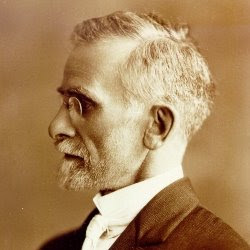 Here is the second section of J.P. Koehler's essay Gesetzlich Wesen Unter Uns, "Legalism Among Us."
Here is the second section of J.P. Koehler's essay Gesetzlich Wesen Unter Uns, "Legalism Among Us."If you read the first section you can start to get an idea of the perspective that Koehler utilizes in his theology. I think that this quote, as well, can further our understanding of his approach, it is from an essay he wrote entitled "The Importance of the Historical Disciplines for the American Lutheran Church of the Present” :
"A degree of mental inflexibility (Geistesstarre) has begun to assert itself, coupled with a hyperconservative attitude which is more concerned about rest than about conservation. This is always the case at the end of a period of mental development. The masses get into a rut which has been worn by what had long been customary. In our case it was dogmatics. This mental inflexibility is not healthy, for if it continues it will lead to death. Both in the mental activity of an individual and of a community, fresh, vibrant, productive activity is a sign of health.

"The inertia of which I am speaking shows itself in a lack of readiness again and again to treat theological-scholarly matters or practical matters theoretically and fundamentally without preconceived notions. This is necessary if we are to watch and criticize ourselves. … And if we do not again and again rethink in detail the most important theological matters and our way of presenting them, it can happen that all of this can become mere empty form without spirit or life. As we practice such self-criticism, we shall find that the divine truths which we draw out of Scripture indeed always remain the same, but that the manner in which we defend them, yes, even how we present them is not always totally correct. Here we can and must continue to learn." In The Wauwatosa Theology, vol. 3 (Milwaukee: Northwestern Publishing House, 1997), 434-435.
Here is the second section of Koehler's Gesetzlich Wesen Unter Uns. (Again, you are not able to read this from a feed...you must come to the blogspot site).



 Probably more than any other theologian, John Philipp Koehler has influenced me the most. His approach to theology and his keen insight into human behavior is astonishing. Gesetzlich Wesen Unter Uns, "Legalism Among Us," is a great example of his thought. Not only has he had a big influence on my own thought, he is also timeless in his observations. His intimate awareness of man's opinio legis, man's law bent mind, is always applicable, for there is nothing new under the sun. Though written in 1914 his words speak directly to what is going on (in many camps) in the LC-MS today. These words from another essay from Koehler seem especially applicable in our situation:
Probably more than any other theologian, John Philipp Koehler has influenced me the most. His approach to theology and his keen insight into human behavior is astonishing. Gesetzlich Wesen Unter Uns, "Legalism Among Us," is a great example of his thought. Not only has he had a big influence on my own thought, he is also timeless in his observations. His intimate awareness of man's opinio legis, man's law bent mind, is always applicable, for there is nothing new under the sun. Though written in 1914 his words speak directly to what is going on (in many camps) in the LC-MS today. These words from another essay from Koehler seem especially applicable in our situation: 

